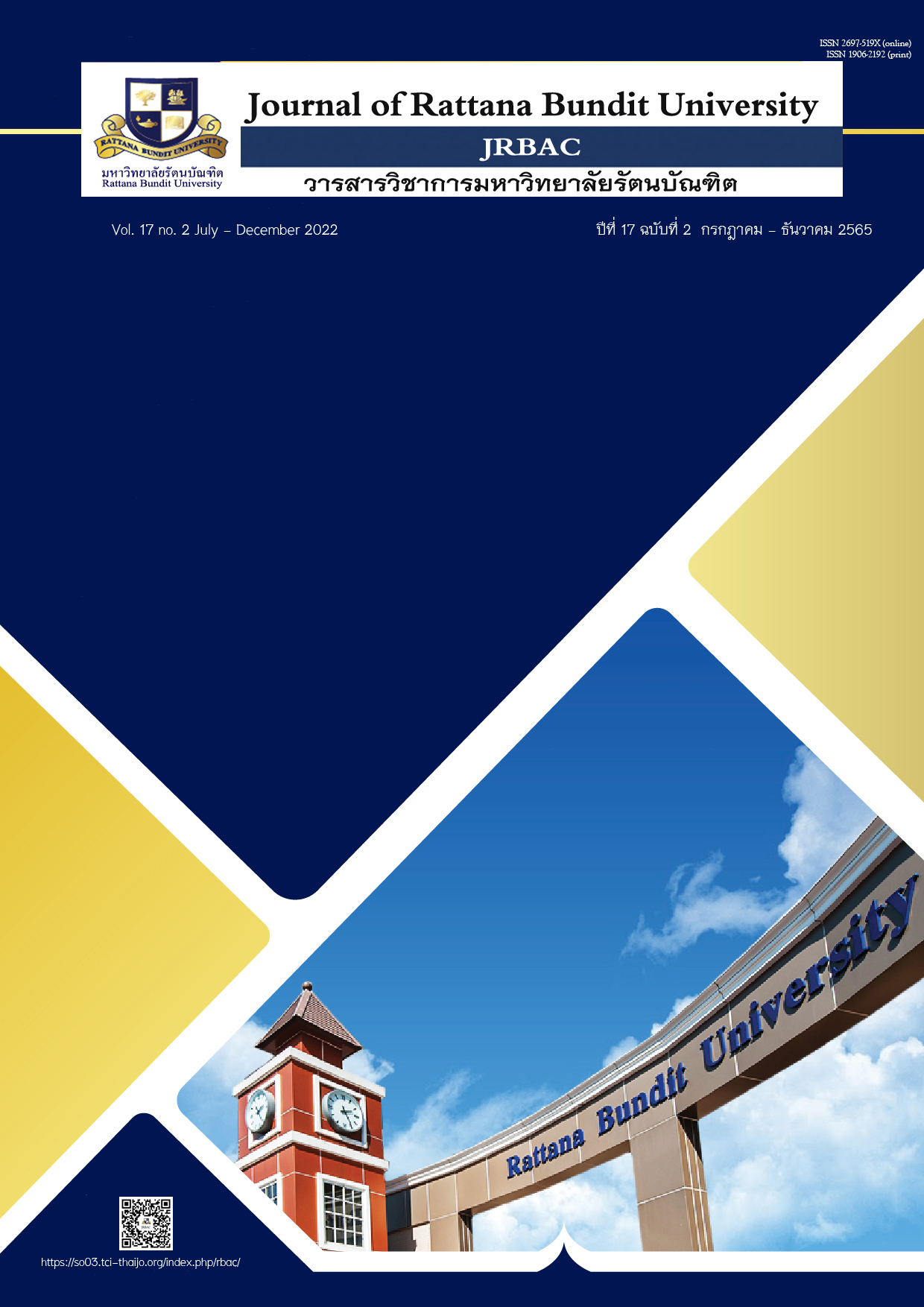Factor Analysis of Teachers’ Scientific Minds of the Secondary Educational Service Area Office, Prachinburi Nakhon Nayok
Main Article Content
Abstract
The scientific mind of the teachers is an essential feature in developing a rational, critical mindset in the students, leading to the ability to solve problems in unexpected situations and promote long-term student development. Consequently, this research aimed to examine the factor analysis study of teachers' scientific minds at the Secondary Educational Service Area Office in Prachinburi, Nakhon Nayok. The sample group for this study comprised 316 administrators and teachers from the Secondary Educational Service Area Office, Prachinburi Nakhon Nayok, who were chosen using stratified random sampling. The research instrument used to collect data was a five-rating Likert scale questionnaire with a reliability of.97. Confirmatory Factor Analysis was employed to examine the data (CFA). According to the results of the study, teachers' scientific minds at the Secondary Educational Service Area Office, Prachinburi Nakhon Nayok included six components, which were weighted as follows: 1) Curiosity, 2) prudence, 3) rationality, 4) persistence, 5) honesty and 6) open-mindedness. The model is an excellent fit for the empirical data at the statistical significance level of .01.
Article Details

This work is licensed under a Creative Commons Attribution-NonCommercial-NoDerivatives 4.0 International License.
References
กัญภร เอี่ยมพญา. (2564). จิตวิญญาณครูในศตวรรษที่ 21. วารสารครุศาสตร์ปริทรรศน์ฯ, 8(2), 398-409.
ขนิษฐา เนื้อไม้. (2555). การศึกษาความสัมพันธ์ระหว่างจิตวิทยาศาสตร์และทักษะกระบวนการทางวิทยาศาสตร์ขั้นบูรณาการของนักเรียนชั้นมัธยมศึกษาปีที่ 3 สังกัดสำนักงานเขตพื้นที่การศึกษาประถมศึกษากำแพงเพชร (วิทยานิพนธ์ปริญญาโท). มหาวิทยาลัยราชภัฏพิบูลสงคราม.
จงรักษ์ ภาโส. (2553). การสร้างแบบวัดจิตวิทยาศาสตร์สำหรับนักเรียนชั้นมัธยมศึกษาตอนต้น (วิทยานิพนธ์ปริญญาโท). มหาวิทยาลัยราชภัฏเพชรบูรณ์.
เจริญวิชญ์ สมพงษ์ธรรม. (2553). การศึกษาแนวโน้มคุณลักษณะของครูไทยในทศวรรษหน้า (พ.ศ.2562). สำนักงานเลขาธิการคุรุสภา
จุลพงษ์ กลิ่นหอม. (2549). การสร้างแบบวัดจิตวิทยาศาสตร์ของนักเรียนระดับชั้นมัธยมศึกษาปีที่ 5 กลุ่มโรงเรียนในเครือมูลนิธิเซนต์คาเบรียลแห่งประเทศไทย เขตกรุงเทพมหานครและปริมณฑล (วิทยานิพนธ์ปริญญาโท). มหาวิทยาลัยศรีนครินทรวิโรฒ.
เฉลิมศักดิ์ มะลิงาม. (2558). การพัฒนามาตรวัดจิตวิทยาศาสตร์สำหรับนักเรียนระดับมัธยมศึกษาตอนต้น:การประยุกต์ใช้การวิเคราะห์กลุ่มแฝงเพื่อกำหนดคะแนนจุดตัด (วิทยานิพนธ์ปริญญาโท). จุฬาลงกรณ์มหาวิทยาลัย.
ทรายทอง พวกสันเทียะ. (2553). การพัฒนาแบบวัดจิตวิทยาศาสตร์สำหรับนักเรียนประถมศึกษา (วิทยานิพนธ์ปริญญาโท). จุฬาลงกรณ์มหาวิทยาลัย.
ทวิทชัย สุดชาฎา. (2549). การพัฒนาแบบวัดจิตวิทยาศาสตร์สำหรับนักเรียนชั้นมัธยมศึกษาปีที่ 3 (วิทยานิพนธ์ปริญญาโท). มหาวิทยาลัยราชภัฏอุบลราชธานี.
นงลักษณ์ วิรัชชัย. (2542). โมเดลลิสเรล: สถิติวิเคราะห์สำหรับการวิจัย. โรงพิมพ์แห่งจุฬาลงกรณ์มหาวิทยาลัย.
ประภาศ ปานเจี้ยง. (2563). จิตวิทยาศาสตร์: ลูกของผม และรัฐบาลของเรา. https://www.matichon.co.th/article/news_2317425
พัชรินทร์ สิงห์สรศรี. (2560). อิทธิพลของความรู้พื้นฐานเดิมและบรรยากาศชั้นเรียนที่มีต่อจิตวิทยาศาสตร์ของนักเรียนระดับชั้นมัธยมศึกษาตอนต้น จังหวัดนครปฐม โดยมีแรงจูงใจใฝ่สัมฤทธิ์เป็นตัวแปรส่งผ่าน (วิทยานิพนธ์ปริญญาโท). มหาวิทยาลัยศิลปากร.
ภพ เลาหไพบูลย์. (2542). แนวทางการสอนวิทยาศาสตร์. ไทยวัฒนาพานิช.
ศักดิ์สิน โรจน์สราญรมย์. (2564). พลิกโฉมการศึกษาไทย. บริษัท พัฒนาคุณภาพวิชาการ (พว.) จำกัด.
ศิริชัย กาญจนวาสี. (2552). การเลือกใช้สถิติที่เหมาะสมสำหรับการวิจัย. สำนักพิมพ์แห่งจุฬาลงกรณ์มหาวิทยาลัย.
ศุกภชัย นนท์ภายวัน. (2561). ความสัมพันธ์เชิงสาเหตุของตัวแปรที่ส่งผลต่อความซื่อสัตย์ของนักเรียนชั้นมัธยมศึกษาตอนปลาย สังกัดสำนักงานเขตพื้นที่การศึกษามัธยมศึกษา เขต 31. วารสารวิทยาลัยนครราชสีมา, 12(3), 40-50.
สถาบันส่งเสริมการสอนวิทยาศาสตร์และเทคโนโลยี. (2546). คู่มือวัดผลประเมินผลวิทยาศาสตร์. โรงพิมพ์แห่งจุฬาลงกรณ์มหาวิทยาลัย.
สถาบันส่งเสริมการสอนวิทยาศาสตร์และเทคโนโลยี. (2555). การวัดและประเมินผลวิทยาศาสตร์. โรงพิมพ์แห่งจุฬาลงกรณ์มหาวิทยาลัย.
สถาบันส่งเสริมการสอนวิทยาศาสตร์และเทคโนโลยี. (2560). ตัวชี้วัดและสาระการเรียนรู้แกนกลางกลุ่มสาระการเรียนรู้วิทยาศาสตร์ (ฉบับปรับปรุง พ.ศ. 2560) ตามหลักสูตรแกนกลางการศึกษาขั้นพื้นฐาน พุทธศักราช 2551. โรงพิมพ์ชุมนุมสหกรณ์การเกษตรแห่งประเทศไทย จำกัด.
สถาบันส่งเสริมการสอนวิทยาศาสตร์และเทคโนโลยี. (2562). การแถลงข่าวการประเมิน PISA 2018. https://pisathailand.ipst. ac.th/news-12/
สมชนก ลดาดก. (2564). การวิเคราะห์องค์ประกอบและตัวบ่งชี้บทบาทครูเพื่อการเรียนรู้ของผู้เรียนในศตวรรษที่ 21. วารสารอิเล็กทรอนิกส์ทางการศึกษา, 16(2), 586-600. https://so01.tci-thaijo.org/index.php/OJED/article/view/253304
สมทบ ไชยฮะนิจ. (2555). การสร้างแบบวัดจิตวิทยาศาสตร์ สำหรับนักเรียนชั้นประถมศึกษาปีที่ 6 (วิทยานิพนธ์ปริญญาโท). มหาวิทยาลัยราชภัฎมหาสารคาม.
สำนักงานเลขาธิการสภาการศึกษา. (2562). สภาวะการศึกษาไทย 2561/2562 การปฏิรูปการศึกษาในยุคดิจิทัล. สำนักประเมินผลการจัดการศึกษาสำนักงานเลขาธิการสภาการศึกษา.
สำนักงานวิชาการการศึกษาขั้นพื้นฐาน. (2551). ตัวชี้วัดและสาระการเรียนรู้วิทยาศาสตร์ ตามหลักสูตรแกนกลางการศึกษาขั้นพื้นฐาน พุทธศักราช 2551. http://academic.obec.go.th/images/document/1580786506_d_1.pdf
Aiemphaya, K. (2021). The teachers’ spirit in 21st century. Journal of Educational Review Faculty of Education in MCU. 8(2), 398-409. (in Thai)
Bureau of Academic Affairs and Educational Standard. (2008). Indicators and subject matter of science learning according to the core curriculum of basic education, B.E. 2551. The Agricultural Co-operative Federation of Thailand, Ltd. (in Thai)
Chaihanid, S. (2012). Development of a scientific mind test for Prathom Suksa 6 students (Master’s thesis). Mahasarakham Rajabhat University. (in Thai)
Glawson. (2011). Thinking like a scientist. https://midwaymsscience.weedly.com/uploads/8/2/9/8/8298729 /section_1_-_thinking_like_a_ scientist.pdf
The Institute for the Promotion of Teaching Science and Technology. (2003). Scientific evaluation manual. Chulalongkorn University Press. (in Thai)
The Institute for the Promotion of Teaching Science and Technology. (2012). Measurement and evaluation of science. Chulalongkorn University Press. (in Thai)
The Institute for the Promotion of Teaching Science and Technology. (2017). Indicators and learning subjects in the core of science learning subject groups (revised edition B.E. 2560) according to the Core Curriculum of Basic Education B.E. 2551. The Agricultural Co-operative Federation of Thailand, Ltd. (in Thai)
The Institute for the Promotion of Teaching Science and Technology. (2019). PISA 2018 Assessment Press Release. https://pisathailand.ipst.ac.th/news-12/ (in Thai)
Jesus Gilberto Concepcion, G. (2020). Development a scientific mind. https://www.researchgate.net/publication/340878957_DEVELOPING_A_SCIENTIFIC_MIND_The_Mathematical_Brain
Kanchanawasri, S. (2009). Selection of appropriate statistics for research. Chulalongkorn University Press. (in Thai)
Klinhom, C. (2006). A construction of a scientific mind inventory for Mathayom Suksa 5 central region schools under Saint Gabrel’s foundation of Thailand (Master’s thesis). Srinakharinwirot University. (in Thai)
Ladadok, S. (2021). Analysis of factors and indicators of teacher roles for student learning in the 21st Century. An Online Journal of Education, 16(2), 586-600. https://so01.tci-thaijo.org/index.php/OJED/article/view/253304 (in Thai)
Laohapaibun, P. (1999). Science teaching approach. Thai Watanapanich. (in Thai)
Malingam, C. (2012). A Development of scientific mind scale for lower secondary school students: Application of latent class analysis for establishing cut scores (Master’s thesis). Chulalongkorn University. (in Thai)
Nonpaywan, S. (2018). Causal relationship of variables affecting honesty of senior high school students under the Secondary Educational Service Area Office 31. Journal of Nakhonratchasima College, 12(3), 40-50. (in Thai)
Nuamai, K. (2012). A study of relationship between scientific mind and integrated science process skills of Mathayomsuksa 3 students under the Jurisdiction of Kamphaengphet Primary Educational Service (Master’s thesis). Pibulsongkram Rajabhat University. (in Thai)
Office of the Education Council. (2019). State of Thai Education 2018/2019 educational reforms in the digital era. Bureau of Evaluation Education, Office of the Education Council. (in Thai)
Organization for Economic Co-operation and Development. (2020). Skills for 2030 concept note. https://www.oecd.org/education/2030-project/teaching-and-learning/learning/skills/Skills_for_ 2030_concept_note.pdf
Panchiang, P. (2020). Scientific mind: My children and our government. https://www.matichon.co.th/article/news_2317425 (in Thai)
Paso, C. (2010). A measurement model of scientific mind for secondary school students (Master’s thesis). Phetchabun Rajabhat University. (in Thai)
Paugsuntear, S. (2010). Development of a scientific mind test for primary school students (Doctor’s thesis). Chulalongkorn University. (in Thai)
Rojsaranrom, S. (2021). Transforming Thai education. Academic Development (IAD) Company. (in Thai)
Rowland. (2005). Guiding the evaluation human. http://www.learndev.org/dl/BtSM2005-Rowland-v2.pdf
Singsornsri, P. (2018). The effect of background knowledge and classroom atmosphere on scientific mind of junior high school students in Nakhon Pathom: The mediation role of achievement motivation (Master’s thesis). Silpakorn University. (in Thai)
Sompongtham, C. (2010). A study on the trend of characteristics of Thai teachers in the next decade (B.E. 2562). The Teachers’ Council of Thailand. (in Thai)
Sudchada, T. (2006). Development of a scientific mind test for Mathayomsuksa 3 students (Master’s thesis). Ubon Ratchathani Rajabhat University. (in Thai)
Visser. (2000). The Scientific Mind in context. http://www.learndev.org/SciMind.html
Wiratchai, N. (1999). LISREL Model: Statistical analysis for research. Chulalongkorn University Press. (in Thai)


